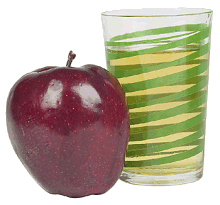Are Fruit Juices Good for You or Not?
The Opposing Views
by www.SixWise.com
Americans drink more than 2 billion gallons of fruit juice every year, and children under 12 are the largest group of juice consumers, according to the American Academy of Pediatrics (AAP).
| 
Most experts agree that whole fruit is better for you than fruit juice. |
In fact, by the time they're 1 year old, about 90 percent of U.S. infants drink fruit juice. And, historically, pediatricians used to recommend fruit juice as a healthy source of vitamin C and extra fluids for kids. Juice makers would agree, and their product is marketed as an incredibly healthy source of vitamins and even calcium.
But is fruit juice really all that good for you?
"Fruit juice certainly has a role to play in healthy living," says Ann Kulze, MD, author of Dr. Ann's 10-Step Diet: A Simple Plan for Permanent Weight Loss and Lifelong Vitality in a WebMD article.
Certain juices, for instance, particularly the dark-colored varieties like cranberry, grape and pomegranate juices, contain antioxidants that may help to fight heart disease and cancer. And when consumed in moderation, fruit juices may provide some protective benefits.
Fruit vs. Fruit Juice: Which is Better?
Most experts will unanimously agree that eating the whole fruit is always better than drinking fruit juice.
"Is juice as good as whole fruit?" asks Michael D. Ozner, MD, president of the American Heart Association of Miami, in WebMD. "No. Fruit has more fiber, fewer calories, and more phytonutrients than juice."
This is because there are certain things lacking in fruit juice that exist in the whole fruit, namely fruit skins, which are loaded with antioxidants like flavonoids, and fruit pulp (the main source of fruit fiber). Fruit juice also elevates your blood sugar level faster than whole fruit, which may contribute to insulin resistance and even diabetes.
Meanwhile, whole foods are almost always better than processed varieties, and all fruit juice is processed. Many juices on the market actually contain only a small amount of real fruit juice along with added sweeteners such as high fructose corn syrup, which may be linked to obesity.
Some of the lower quality brands also contain artificial colors and flavors in addition to added sugar, and these drinks are really no healthier than a can of soda.
| 
When giving fruit juice to kids, the American Academy of Pediatrics recommends giving a limited amount, and not serving it in a bottle or sippy cup that allows your child to consume it easily throughout the day. |
Even when it is 100 percent fruit juice, most nutritionists will agree that you are better off eating a piece of fruit than drinking a glass of juice.
"Fruit juice offers no nutritional benefits over whole fruit," concluded the AAP.
How to Make Fruit Juice a Healthy, Not Detrimental, Part of Your Diet
As long as you consume it in moderation (8 ounces a day of 100% juice is acceptable, says Dr. Ozner), fruit juice can be included in your diet. While it certainly is preferable to soda or other sweetened drinks from a vitamin perspective, keep in mind that it is still high in calories.
Therefore if you are trying to lose weight, fruit juice won't help you do it (choose water for that purpose). In fact, a study in the Journal of Clinical Endocrinology and Metabolism even found that fructose, a sugar in fruit juice, may promote weight gain.
What about giving juice to kids? The AAP has come out with a new set of guidelines for juice consumption for children, which says:
-
Infants less than 6 months old should not be given fruit juice.
-
Infants 6 months to 12 months old may have up to 4 ounces a day.
-
Children 1 year to 6 years old may have up to 4-6 ounces a day.
-
Children 7 years and older may have up to 12 ounces a day.
-
Excessive juice consumption may lead to over-nutrition or undernutrition, and may cause diarrhea, flatulence, abdominal distention and tooth decay.
-
Infants should not be given juice in a bottle or covered cup that allows them to consume juice easily throughout the day.
-
Infants should not be given juice at bedtime.
-
Children should be encouraged to eat whole fruits.
Further, there are major differences in juice quality out there. Here's what to look for, and avoid, when choosing a fruit juice for yourself or your child:
-
Choose 100-percent fruit juice only.
-
Avoid "fruit drinks," "fruit-juice cocktails," "fruit beverages," and any juices that have added sugars, flavors or colors.
-
Choose dark-colored fruit juices (such as grape, cranberry, pomegranate, and blueberry), as they're rich in antioxidants.
-
Look for juice that has sediment on the bottom of the jar. This means the fruit skins, which are very nutritious, were used in the processing (and be sure to shake the bottle up before your pour a glass).
-
If you love fruit juice but want to limit your calories, mix half a serving with sparkling water.
Recommended Reading
The 8 Top Dietary Mistakes Healthy Eaters Make
Yumberry: The Super-High Antioxidant Subtropical Fruit From China That Will Make America Say "YUM"
Sources
The American Academy of Pediatrics
MedicineNet.com
The World's Healthiest Foods